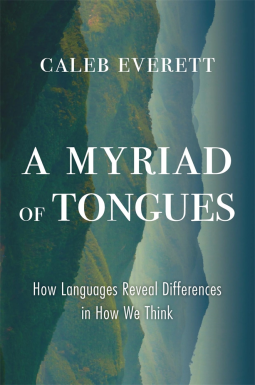
A Myriad of Tongues
How Languages Reveal Differences in How We Think
by Caleb Everett
This title was previously available on NetGalley and is now archived.
Send NetGalley books directly to your Kindle or Kindle app
1
To read on a Kindle or Kindle app, please add kindle@netgalley.com as an approved email address to receive files in your Amazon account. Click here for step-by-step instructions.
2
Also find your Kindle email address within your Amazon account, and enter it here.
Pub Date Sep 19 2023 | Archive Date Sep 19 2023
Talking about this book? Use #AMyriadofTongues #NetGalley. More hashtag tips!
Description
A sweeping exploration of the relationship between the language we speak and our perception of such fundamentals of experience as time, space, color, and smells.
We tend to assume that all languages categorize ideas and objects similarly, reflecting our common human experience. But this isn’t the case. When we look closely, we find that many basic concepts are not universal, and that speakers of different languages literally see and think about the world differently.
Caleb Everett takes readers around the globe, explaining what linguistic diversity tells us about human culture, overturning conventional wisdom along the way. For instance, though it may seem that everybody refers to time in spatial terms—in English, for example, we speak of time “passing us by”—speakers of the Amazonian language Tupi Kawahib never do. In fact, Tupi Kawahib has no word for “time” at all. And while it has long been understood that languages categorize colors based on those that speakers regularly encounter, evidence suggests that the color words we have at our disposal affect how we discriminate colors themselves: a rose may not appear as rosy by any other name. What’s more, the terms available to us even determine the range of smells we can identify. European languages tend to have just a few abstract odor words, like “floral” or “stinky,” whereas Indigenous languages often have well over a dozen.
Why do some cultures talk anthropocentrically about things being to one’s “left” or “right,” while others use geocentric words like “east” and “west”? What is the connection between what we eat and the sounds we make? A Myriad of Tongues answers these and other questions, yielding profound insights into the fundamentals of human communication and experience.
Caleb Everett, Professor of Anthropology and Psychology at the University of Miami, is the author of Numbers and the Making of Us and Linguistic Relativity: Evidence across Languages and Cognitive Domains.
Advance Praise
“A gift for language is a large part of what makes us human, but as Caleb Everett shows, that gift manifests itself in an astonishing spectrum of ways. As previous certainties about the structure of language erode and dissolve under pressure from new discoveries, researchers in many fields are finally grasping the importance of linguistic diversity. This is a careful yet deeply provocative work.”—Mark Abley, author of Spoken Here: Travels Among Threatened Languages
Available Editions
| EDITION | Hardcover |
| ISBN | 9780674976580 |
| PRICE | $27.95 (USD) |
| PAGES | 288 |



